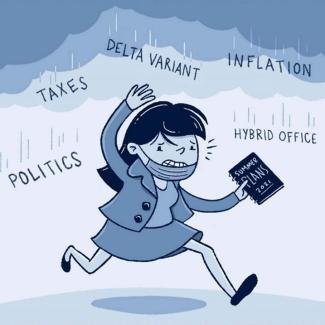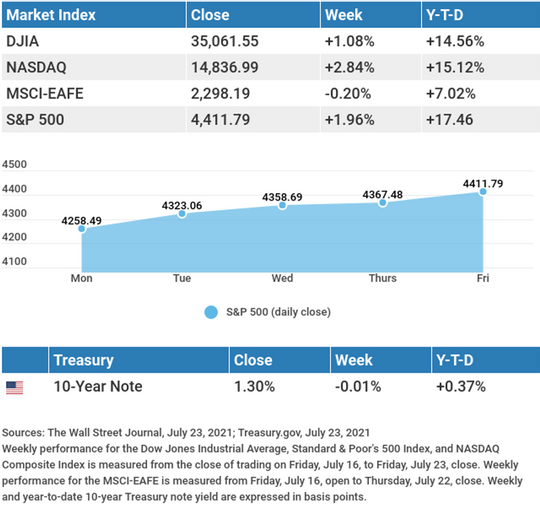
Let’s talk about market volatility
Hello Eagle Wealth Community,
There's a lot going on in the world right now.
We thought this email was going to be about the $3.5 trillion budget deal or what to do with any child tax credits that may be heading your way.
But then global markets jolted on fears of new viral variants. And then they quickly recovered.
Is the sky actually falling?
Could a big correction happen?
Before we give you our take on what's going on, let us first ask:
How are you doing?
How is your summer going?
What's exciting in your world right now?
(We'd love to hear about it and celebrate with you.)
What's worrying you?
(So we can share the burden with you.)
We are living in interesting times and we'd like to stay connected to what's going on in your life.
Now, on to the recent market volatility.
After hitting record highs recently, markets tumbled in early July but then quickly recovered again.
Why?
Mostly fears of a COVID-19 resurgence caused by the delta variant that could derail the economic recovery.
Case numbers are rising globally, even in countries with high vaccination rates, and the surge could lead to a return to travel restrictions and business closures.2
Could these market jitters cause a 10%+ correction?
Absolutely.
Should we panic and freak out?
Definitely not.
Here are a couple of reasons why:
Summer months can bring higher volatility, perhaps because of lower trading volume, making bad news shake the market harder.3
We've had a pretty long winning streak, and corrections are part and parcel of a healthy market, especially when we're near all-time highs.
New variants and higher case counts are a threat. However, vaccination rates are continuing to rise, and experts don't think that we'll see the devastating health outcomes we saw last year.4
Could the delta variant cause the economy to slow down?
It's hard to say at this point. The rosy projections about the economy have been based on a swift return to normal from the shortest recession in history.5
If surging case counts cause a resumption of business and travel limits, we could definitely see a hit, especially in recovery-dependent industries like airlines, cruises, and hotels.
Supply chain issues are still causing materials shortages, creating delivery delays of goods, and potentially triggering slowdowns in industries such as building and construction.6
However, consumer spending is still very strong and the economy is in way better shape than it was last year.7
Bottom line: we could see some economic complications due to the delta variant and we're likely to see more market volatility ahead, especially if economic data disappoints.
We're keeping an eagle eye on the trends and will be in touch with you personally if your strategy needs to change.
Have questions? Please reach out. We’re always here to help.
Calmly,
Your Eagle Wealth Team
|
|
Delta Variant Head Fake Stocks staged a broad retreat on Monday as traders worried about the adverse economic implications of growing Delta variant infections. Economically sensitive sectors, such as energy, financials, industrials, and materials, absorbed the brunt of Monday’s sell-off. But the markets did a quick about face, posting four-consecutive days of gains and leaving the three major averages with fresh record highs.4 The sharp reversal may be attributable to a “buy on the dip” investor mentality, the absence of investment alternatives to stocks in this low interest rate environment, and massive financial liquidity. Stocks were also lifted by a healthy kick-off to the second quarter earnings season. Strong StartThe earnings season moved into full swing last week, and the results exceeded the market’s high expectations. Of the 120 companies in the S&P 500 index that have reported as of Friday, July 23, 89% of them beat the Street’s earnings-per-share estimates by, on average, 20.6%. Financials and Consumer Discretionary sectors provided the biggest earnings surprises (+28.9% and +24.5%, respectively), while Materials and Utilities delivered the smallest positive surprises (+5.3% and +2.5%, respectively). These earnings beats are leading Wall Street analysts to raise earnings estimates for 3Q 2021 through 1Q 2022.5 Final ThoughtThe National Bureau of Economic Research said last week that the pandemic-induced recession ended in April 2020, officially lasting two months and making it the shortest recession in U.S. history.6 This Week: Key Economic DataMonday: New Home Sales. Tuesday: Consumer Confidence. Durable Goods Orders. Wednesday: FOMC (Federal Open Market Committee) Announcement. Thursday: GDP (Gross Domestic Product). Jobless Claims. Source: Econoday, July 23, 2021 This Week: Companies Reporting EarningsMonday: Tesla (TSLA), Lockheed Martin (LMT). Tuesday: Apple, Inc. (AAPL), Microsoft Corporation (MSFT), General Electric (GE), Advanced Micro Devices, Inc. (AMD), Visa (V), Alphabet, Inc. (GOOGL), Starbucks Corporation (SBUX), 3M Company (MMM), United Parcel Service, Inc. (UPS), Mondelez International (MDLZ). Wednesday: Facebook, Inc. (FB), The Boeing Corporation (BA), Qualcomm, Inc. (QCOM), Bristol Myers Squibb (BMY), Paypal Holdings (PYPL), Pfizer, Inc. (PFE), McDonalds Corporation (MCD), Shopify, Inc. (SHOP), Servicenow, Inc. (NOW), Thermo Fisher Scientific, Inc. (TMO). Thursday: Amazon.com, Inc. (AMZN), Ford Motor Company (F), Mastercard (MA), Twilio, Inc. (TWLO), Merck & Company (MRK), The Southern Company (SO), Northrop Grumman (NOC), Comcast Corporation (CMCSA), AnheuserBusch InBev (BUD), Abbvie, Inc. (ABBV). Friday: Exxon Mobil Corporation (XOM), Caterpillar, Inc.(CAT), Chevron Corporation (CVX), Procter & Gamble (PG), Charter Communications, Inc. (CHRT). Source: Zacks, July 23, 2021
|






